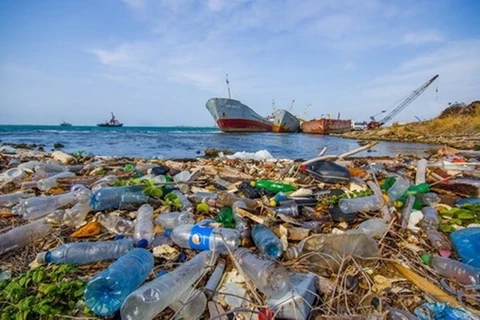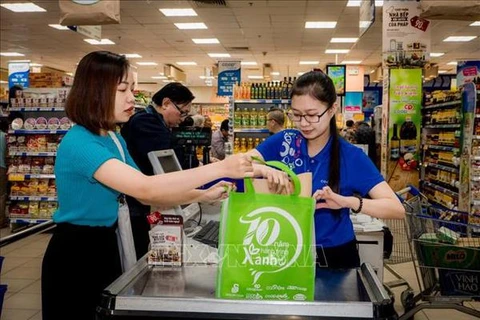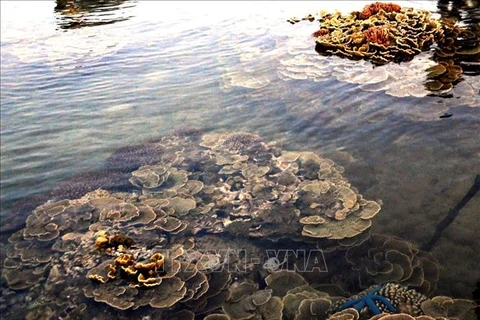 Illustrative image (Source: baodautu.vn)
Illustrative image (Source: baodautu.vn) Hanoi (VNA) – Amid the increase of plastic waste, especially plastic bags, it is necessary to strengthen the management of the waste as the effectiveness of the work has fallen far below the requirements.
According to the Vietnam Environment Administration under the Ministry of Natural Resources and Environment, domestic solid waste has increased with a forecast rise of 10-16 percent each year in the near furture, with a higher ratio of undegradable waste, including plastic waste.
The Vietnam Plastic Association reported that the country has about 2,000 plastic firms with the total production of about 4 million tonnes per year, 36 percent of which is packaging plastics, including plastic bags, bottle and packages.
The use of undegradable and single-use plastic products has also increased in both Vietnam and the world.
Nguyen Thanh Nam from the Department of Waste Management under the Vietnam Environment Administration said that the number of plastic packages and bags released to the environment has been rising through years, while the classification and collection of waste has still limited in households, and the majority are released to the environment.
The Environment Protection Law clarifies the need to minimise, recycle and reuse plastic waste to prevent plastic pollution in oceans. Meanwhile, the Prime Minister issued Directive 33/CT-TTg on August 20, 2020 on strengthening management over reusing, recycling and minimising of plastic waste.
In late July this year, the Prime Minister also approved a project to improve plastic waste management in Vietnam, aiming to improve mechanisms, policies and legal regulations in the field.
Under the project, Vietnam targets 100 percent of environmentally-friendly plastic bags and packaging used at shopping malls and supermarkets by 2025, while all tourism complexes, hotels and other lodging facilities do not use non-biodegradable plastic bags and single-use plastic products.
The country also aims to collect, reuse, recycle and treat 85 percent of plastic waste; and reduce the volume of plastic waste dumped to ocean by half.
Additionally, the project will gradually cut the production and consumption of non-biodegradable plastic bags and single-use plastic products in daily life; while raising awareness among organisations, enterprises and the community about the harmful effects of single-use plastic items to the environment, ecosystem and human health, and encouraging consumers to shift away from single-use and non-biodegradable plastics to eco-friendly alternatives.
It will campaign producers and distributors of single-use and non-biodegradable plastic products to shift to eco-friendly equivalents and promote the development and application of advanced technology in plastic waste management and manufacturing of environmentally-friendly products.
In the 2021-2026 period, the Ministry of Natural Resources and Environment will apply various measures to strengthen management over plastic waste.
According to Vice Director of the Vietnam Environment Administration Nguyen Thuong Hien, the measures include completing regulations on plastic waste management, making assessments of the plastic collection situation, strengthening communications in the work, researching and applying technology in plastic waste management and environmental-friendly product production.
Meanwhile, tourism sites and facilities will have to commit to not using single-use plastic products, while the collection of plastic waste in coastal localities, beaches and tourist sites will be strengthened, along with the increase of inspection over the work.
Currently, the ministry as well as relevant ministries, sectors and localities are building plans with specific tasks for particular agencies under their management./.
VNA























